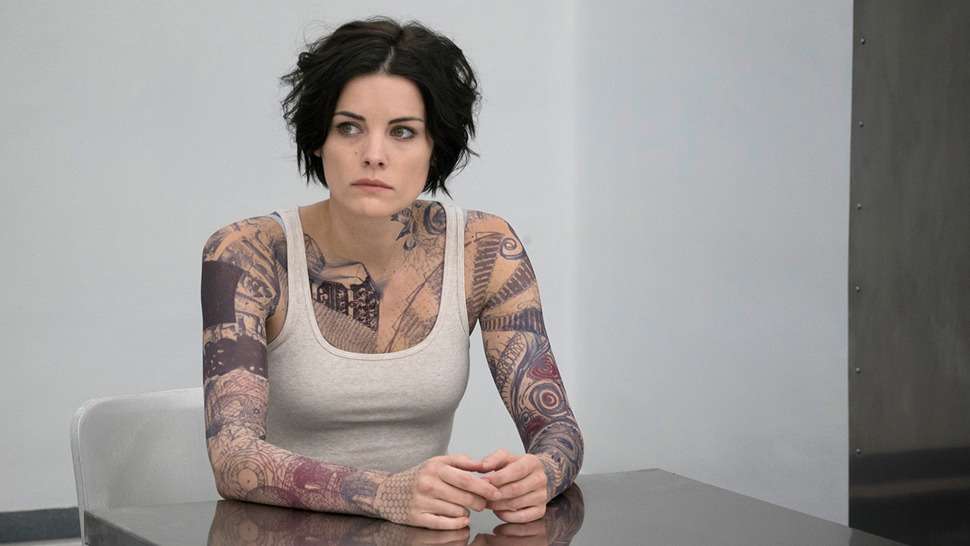Fall Television Season Kicks Off, Regardless of Whether Networks Admit It
Three new shows premiere Monday.

- Life In Pieces. CBS. Monday, September 21, 8:30 p.m. EDT.
- Minority Report. Fox. Monday, September 21, 9 p.m. EDT.
- Blindspot. NBC. Monday, September 21, 10 p.m. EDT.
Every year the broadcast networks say, hey, this time we're serious and there are no fall or summer TV seasons or ratings periods, just one seamless year-round blur of exquisite programming (except for the pig swill on the air of our competitors).
And every year, we reach the second or third week of September, and suddenly there are a ton of new shows and two tons of hoopla and, soon after, a round of interviews in which it's carefully explained that, hey, all that illiterate, Godless-sodomite crap was put into development by my late, burning-in-hell predecessor, but anyway, it doesn't matter, because, like we told you, there is no fall TV season.
So, here we are at the beginning of not-the-fall-TV-season. Over the next six weeks, a score of new shows will pop up like mushrooms after a spring rain—and, like mushrooms, a few will be fit for fillet de beouf aux morilles, a bunch will go pretty well with pizza, and a handful will bring on repellent hallucinations and projectile vomiting.
There will be tattooed amnesiacs, homicidal sorority girls, precognitive mutants, suppurating pus, evil frackers, renegade pathologists, trust-fund twits, fake lawyers, real lawyers, slice-and-dice serial killers, precocious and highly slappable children, body-snatching doctors, housewives-turned-doctors and FBI agents-turned-terrorists. And that's just in the blue states.
As opening nights go, September 21 isn't a bad one, featuring an innovative sitcom and two sci-fi-ish dramas that are highly derivative but also highly entertaining. You could do worse. You will do worse.
Life in Pieces, the sitcom, is a nifty piece of work, a multigenerational extended-family comedy that tells its stories each week in four interlocked chunks, each one focusing on a different set of characters at a different stage of life. Parents James Brolin and Dianne Wiest are retired and musing occasionally about what comes next, which isn't a condo in Sun City. (In the pilot episode, Brolin is staging his birthday party as a mock funeral so he can hear his eulogies in advance. Do not try this at home.)
Of their adult children, one (Thomas Sadoski, The Newsroom) is starting a new—and, as it turns out, slightly polyandryish—relationship. Another (Colin Hanks, Fargo) has just fathered his first child, triggering his first "ravaged vagina" joke. And a third (Betsy Brandt, the klepto cop-wife of Breaking Bad) is thinking about repopulating her nest as one of the kids heads off to college. Sure, her husband (Dan Bakkedahl, Veep) agrees: "What are the odds that we mess up four in a row?"
The four-story aspect of Life in Pieces is interesting, if only in keeping the viewer guessing about how the vignettes connect. It's also unlikely to last. In 2002, NBC introduced, to great critical acclaim, a cops-and-courts drama called Boomtown, in which stories were told sideways, backwards, basically any way but chronologically. The series won a Peabody award but by the second season was using stories with beginnings, middles and ends. When you've got to pump out 18 to 22 episodes a year, experimental story-telling quickly becomes exhausting.
Happily, what really carries Life in Pieces is not avant-garde form but the traditional lifeblood of sitcoms, good writing and funny performances. Whether it's a scandalized child who's just been tipped to the real nature of Santa Claus ("So it's this giant conspiracy that everyone's in on but me?") or a father's botched attempt at filial camaraderie with a maturing son (it turns out there's a reason that Hallmark doesn't make cards about losing your virginity to a couch), Life in Pieces is just pretty damn funny.

Fox's Minority Report and NBC's Blindspot don't pretend to be bringing anything new to the television gene pool; each has deep genre roots. Minority Report, about a family of precognitive mutants who use their talents to help police stamp out crimes before they happen, is derived from the 2002 Steven Spielberg film of the same name (Spielberg and much of his team from TNT's war-of-the-worlds drama Falling Skies are the producers) and the 1956 Philip K. Dick short story on which it was based. And Blindspot, in which a gorgeous young amnesiac begins recovering memories that are at first exotic and then sinister, borrows heavily from a variety of sources.
These sources include The Long Kiss Goodnight, a 1996 film with Geena Davis as a grade-school teacher who suddenly discovers she has skills with blades that are not restricted to julienning vegetables, and the short-lived 2002 Fox sci-fi series John Doe, about a mysterious amnesiac savant who becomes a cult deity, but is mostly notable for being canceled before revealing even a single clue about who he really was. Blindspot may even cadge a tiny bit from the 2007 ABC sitcom Samantha Who?, which starred Christina Applegate as a real-estate executive left without any memory after a traffic accident—and then starts to remember, bit by bit, that she was the world's worst bitch.
The twist in Blindspot is that the Jane Doe found in Times Square (Jaimie Alexander, Agents Of S.H.I.E.L.D) is covered in cryptic tattooed messages (so thoroughly, in fact, that NBC can even get away with a nude scene because it looks like she's fully clothed). They include the name of FBI agent Kurt Weller (Sullivan Stapleton, 300: Rise of an Empire), who is as clueless as everybody else as to who Jane is or what any of it means. But together they begin to investigate the messages, which seem to be clues to some kind of nameless but dread conspiracy.
The whodunit and dunwhat? elements of Blindspot are terse, fast-pitched and intriguing. But, as they say in those commercials, past performance is not a guarantee of future results: The television graveyard is full of oracular shows, like Lost and Heroes, that went sideways after the first few episodes, because their producers turn out to have not thought much past the high-concept pitch.
What offers greater hope for Blindspot is that it is not, at its heart, a conspiracy thriller, but a mediation on self: Is our identity the sum of our memories, or something more? Is obliterating the past a second chance, or simply a condemnation to repeat the same mistakes out of ignorance? Alexander's performance as the lost soul Jane Doe, gives these questions remarkable and poignant life. When, caught in an unexpectedly and desperate situation, she picks up a gun, the emotions that flash across her face like a news ticker—from fear to recognition to wonder to desolation—tell more of her story in five seconds than you could cram into a thousand lines of dialogue.
The somewhat related issue of free will vs. determinism is woven into Minority Report, as it was in its namesake movie and short story. That is, whether by God's will or genetic imperatives or Facebook algorithms, is the future fixed?
Minority Report is not, however, a remake of the film but a sequel, set 10 years later, long after the dissolution of that PreCrime Unit that was trying to toss Tom Cruise in the slam for a murder he hadn't committed yet. And unlike the work's previous incarnations, this Minority Report focuses mainly on the kids whose precognitive abilities powered the unit.
They're grown up now, and after a long exile, they've returned to society anonymously, living relatively ordinary lives. Older sister Agatha (Laura Regan, Dagny Taggert in the Atlas Shrugged films) has an existence of quiet domesticity; Arthur (Nick Zano, One Big Happy) has channeled his prophetic talents into big money in the financial world. His twin Dash (Stark Sands, Generation Kill) is a slacker, scrounging free drinks from bartenders with penny-ante mentalist tricks.
But Dash has a frightening secret: lurid, terrifying visions of murders that turn out to be real. He tries to prevent the crimes, but the precogs always operated as a hive, and without his siblings, Dash doesn't know the identities of the victims or their killers, or even where the murders will take place.
Eventually Dash hooks up with renegade detective Lara Vega (Meagan Good, Deception) whose frustration with a string of unsolved murders overcomes her faith in the conventional wisdom that the PreCrime Unit was a discredited failure. She's only slightly sobered by Dash's warning that the precogs didn't always see crimes in the same way and that without his brother and sister's participation, their system of checks and balances is in disarray.
Meanwhile, there are hints that something malign is stirring out there. When Vega is on the verge of capturing one of the murderers from Dash's visions, he warns her, "You have no idea what's coming," before killing himself.
If Minority Report is a satisfying stew of crime drama and sci-fi adventure, the seasoning is sly wit. The sight gags in the margins run from selfie drones to fast-food joints staffed entirely by robots, who presumably work for a lot less than the $15 "living wage" progressives are demanding for burger-flippers these days. Jokes at the expense of the Luddite Left are frequent, including a scene of cops gobbling down greasy french fries as one exclaims, "Can you believe these used to be unhealthy? Thank God for the genetic revolution." By the way, the Washington Redskins have somewhere along the way become the Washington Red Clouds. But even in the furthest frontiers of Spielberg's imagination, they haven't been able to find a competent quarterback.


Show Comments (14)